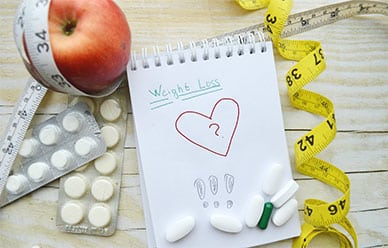Does Crash Dieting Hurt Your Heart?
Many people all over the globe are endlessly trying to lose a few pounds -- or more. While doctors recommend accomplishing this through sustainable lifestyle changes, the diet industry often has other ideas. Advertisements on television, the internet and in magazines often claim that people can lose weight quickly through extremely restrictive diets. However, crash dieting is ineffective, with most people gaining back the lost weight and often more quickly after losing it. In addition, research is finding that these diets can have a wide variety of negative effects on overall health, particularly heart health.
The Dangers of Crash Dieting
Crash diets include a wide variety of approaches. These diets include popular "cleanses," intermittent fasting, detox plans and other diets. Regardless of the name, these diets all have one thing in common: extreme restriction of calories in the name of fast weight loss. While most dieters will indeed lose weight quickly by eating a minimal amount of calories, this approach has several negative health effects.
 The foremost argument against a crash diet is that they aren't sustainable. People require a certain amount of protein, fat and vitamins to survive. Eventually they will return to their old eating habits. In addition, crash diets also can have the following negative effects:
The foremost argument against a crash diet is that they aren't sustainable. People require a certain amount of protein, fat and vitamins to survive. Eventually they will return to their old eating habits. In addition, crash diets also can have the following negative effects:
- Nutrient deficiencies: Several essential vitamins and minerals must be eaten in order to sustain good health. A very low calorie diet is unlikely to provide these.
- A feeling of unwellness: Restricted caloric intake can leave people feeling fatigued and foggy.
- Lower metabolism: A body starved of calories will conserve them by slowing your basal metabolic rate.
- Loss of lean muscle: Although your body will burn fat to create energy, it also will burn muscle tissue.
- Decreased mental health: Caloric restriction is bad for mental health, leading to a higher rate of depression, eating disorders and other mental illness.
- Decreased immune system: The immune system relies on certain vitamins to keep our immune system running effectively.
According to new research, a crash diet also may have more serious effects, particularly on the cardiovascular system.
Can Restrictive Dieting Hurt Your Heart?
Doctors have long noted a link between restricted calorie diets and cardiac arrhythmias. This is likely due to deficiencies of certain minerals and electrolytes that are essential to coordinated cardiac muscle function. In addition, crash diets have been linked to extremely low blood pressure, which can cause a variety of negative effects including dizziness and fainting.
However, a new study shines light on other ways that extreme dieting can be bad for your health. Researchers used MRI, an advanced imaging technique, to look at the hearts of people who were using crash diets to lose weight. Although their overall body fat fell quickly, the fat surrounding their hearts actually increased by 44 percent. This sudden increase can make it much more difficult for the heart to effectively perform its main role of pumping blood. Predictably, the study participants also saw a corresponding decrease in heart function.
Both heart function and cardiac fat returned to normal after about eight weeks. However, this decrease in cardiac function could be dangerous for people with underlying cardiac conditions. Many people have conditions that they do not know about until the heart is strained, which can then become serious and even life-threatening.
The Benefits and Drawbacks of Extreme Dieting
Dr. Jennifer Raynor, one of the researchers, notes that there are also benefits to some extremely restrictive diets. People in the study saw a decrease in liver fat, less insulin resistance (the driving force behind type 2 diabetes) and other health benefits likely due to the weight loss. Many people benefit from getting closer to a healthy weight, however they decide to approach it. The answer, according to her, is to involve your physician.
"If you have heart problems, you need to check with your doctor before embarking on a very low-calorie diet or fasting. People with a cardiac problem could well experience more symptoms at this early time point, so the diet should be supervised."
Losing Weight the Healthy Way
There are healthy ways to lose weight without straining your heart. However, these require long-term, sustainable lifestyle changes. If you are ready to lose weight for good, there are several approaches that have been found to be effective.
The most sensible way to lose weight long-term is to focus on eating healthy, with only a small calorie deficit. Most doctors recommend 1-2 pounds of weight loss a week as the perfect number. Find exercises that you enjoy enough to perform on a regular basis and make them part of your daily routine. In other words, change your entire approach to diet and exercise.
In addition, simply changing the times that you eat can help you to lose weight. Like all parts of the human body, your metabolism has a circadian rhythm. Eating at the same times every day allows your body to stay out of starvation mode and keeps your metabolism on a predictable schedule. There is also evidence that eating in the evening is more likely to cause weight gain due to metabolic changes that happen as our bodies prepare to sleep.
Losing weight can be difficult for many people. Losing weight in the wrong ways may even be dangerous. However, achieving a healthy weight is one of the most important things that a person can do to reduce disease risk and ensure that they enjoy the best possible health.




